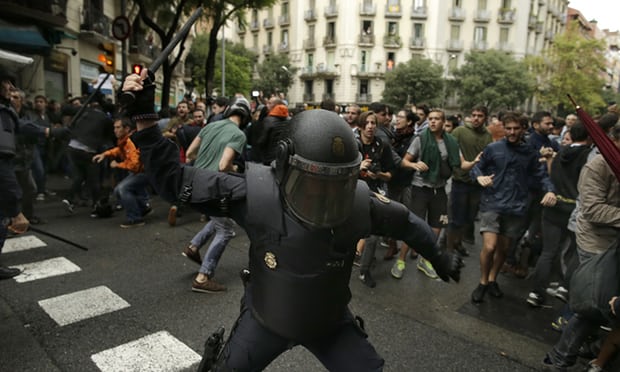
On Sunday, I watched innocent people being beaten up, pulled by their hair and thrown down stairs – just for trying to express their opinion in a ballot – people back home in Catalonia who could easily have been neighbours or school friends. I was glued to my screen for 12 hours with tears in my eyes, sitting in my room in London.
Catalan leader calls for mediation with Spain over independence
As a Catalan living in the UK while the EU referendum played out, having seen the false promises made in favour of Brexit, I could not support the idea of independence. I respected the idea of a referendum – we live in a democracy and people should have a right to decide and I understood the frustration of many Catalans – but I did not think independence was the solution. That was before Sunday. But having seen the way the Spanish government decided to use force to fight the will of peaceful citizens, where does that leave me?
After six years in the UK, I know how it feels to be rejected from the place I now call home, and have learned that separation, borders and flags are rarely the answer. While trying to come to terms with where EU citizens like me sit in the divided country I now live in, a feeling of division is also growing back home.
The division comes from both sides, though. Spain does not want to see Catalonia leave, but it is certainly going about preventing it in the wrong way. Early last week videos appeared of hundreds of people in the south of Spain seeing off police cars leaving for Catalonia to help the central government, shouting “Go get them!”, while waving Spanish flags. It said it all. It felt as though we were back in the Spanish civil war. At a cafe in Madrid, on referendum day, my brother overheard a group of women saying: “These Catalan people just need a couple of slaps to learn they have to stay.”
As the Catalan journalist Jordi Évole said: “Many Catalans had already left Spain mentally. Yesterday Rajoy got a few more. Yesterday many citizens against independence felt a huge repulsion for what they saw.” I’m in that last category – I still don’t think independence is the solution, but I don’t want to be represented by a government that uses military tactics to deal with a dissatisfied region.
Just as many Brits do not feel represented by Theresa May, Mariano Rajoy does not represent all Spaniards – many feel ashamed of their government’s actions against their neighbours. Many took to the streets in Madrid to show solidarity.
What is going through Rajoy’s mind? Was it total incompetence, being caught off guard by a momentum that not even Catalonia’s president, Carles Puigdemont, expected? Or, has Rajoy done the political maths and decided that actually, those women in the cafe in Madrid who think the Catalans deserve a slap to bring them in line are representative of enough of the electorate?
Regardless, Rajoy has turned what should have been just another unofficial poll that went largely unnoticed outside the country into a referendum on having a referendum that has shocked the world. And the answer is a resounding yes.
While almost 900 Catalans bear the wounds of police aggression, the Catalan government is still negotiating what will happen in the next 48 hours, and the king of Spain is yet to be seen.
The People’s party’s deputy leader, Soraya Sáenz de Santamaría, seemed to have been watching a different TV channel to me when she said: “The policemen were only fulfilling the orders of justice, acting with professionalism and proportionality. The objective of their acts was never the people, but the electoral material.”
Rajoy’s incompetence cannot be overstated, but Puigdemont cannot be absolved of responsibility. Both are playing Russian roulette with a young nation struggling with deep structural issues. Brinksmanship is common in politics, and has become more so in recent times, but purposely pitting citizens against each other, forcing them to decide which flag to hang from their balcony, takes reckless politics to a new and terrifying level.
I fear Puigdemont’s impulse to declare independence would only result in Spanish tanks entering Barcelona’s La Diagonal, just as happened 78 years ago, witnessed by a generation who did not expect that to happen again in their lifetime. The suppression Catalans lived with during the Franco dictatorship has remained in people’s hearts, and has been transmitted to my generation. My friends and I, born in the 1990s, grew up feeling that Catalan culture and history is part of our identity. We didn’t dance flamenco, we didn’t support bullfighting. We had our own traditions.
On the week leading to referendum day, the Spanish government’s reaction changed my mind
I am Catalan, feel Catalan, was educated in Catalan. I am also Spanish and European. Up until recently, these sides have been easy to reconcile. It feels as though something has changed. My initial instinct was not to vote, and to let the people who have something to say say it.
But in the week leading to referendum day, the Spanish government’s reaction changed my mind. It felt like this was no longer about nationalism but about democracy and free speech. Had I been at home over the weekend I probably would have taken to the streets in support of my fellow Catalans, voting blank as Barcelona mayor Ada Colau did. This is about having a conversation and opening dialogue.
Those Catalonians who wanted to vote for independence were united by the desire for self-determination, regardless of age, social class or political ideology. Now I wouldn’t be surprised to see that group grow, united behind a message of democratic rights.
Whatever is next for the independence movement, one thing is sure. There will forever be a before and after 1 October in both Spanish and Catalan history.
GUARDIAN US
END

Be the first to comment